Managing Time There are 168 hours in



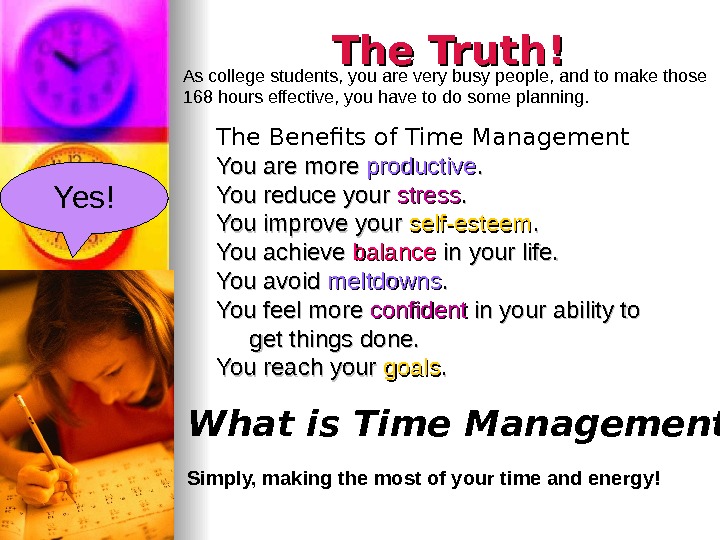

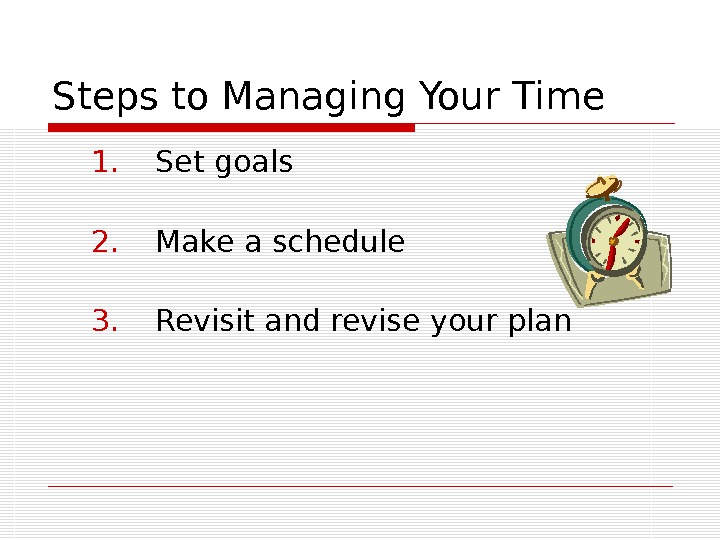
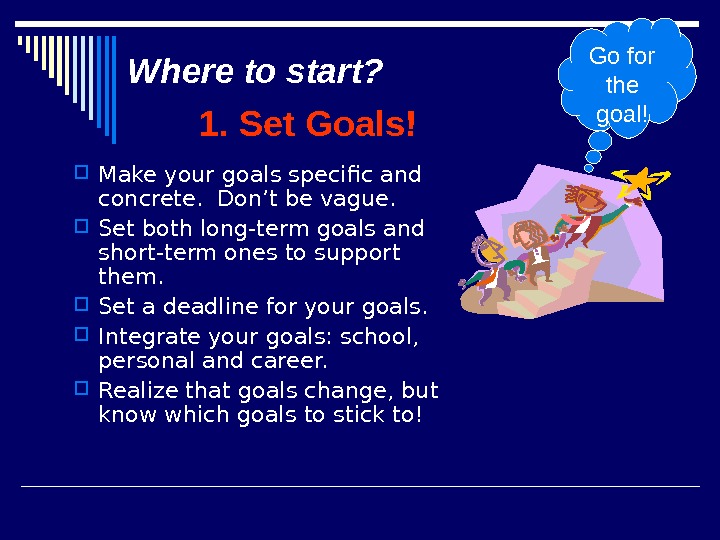

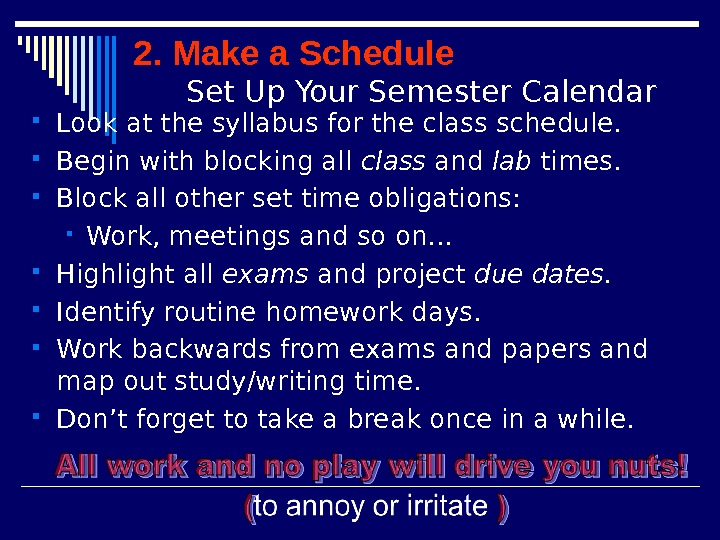


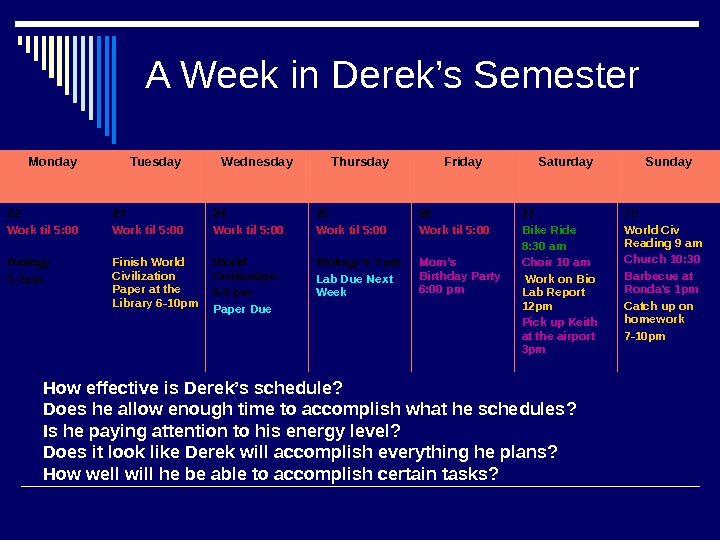
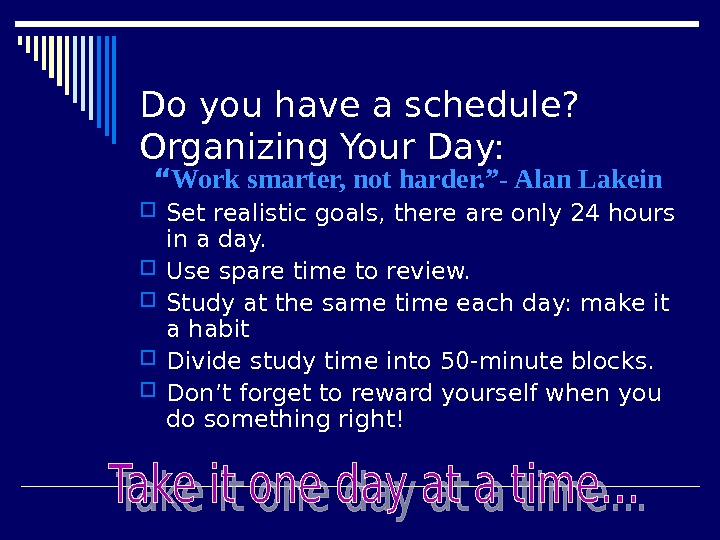
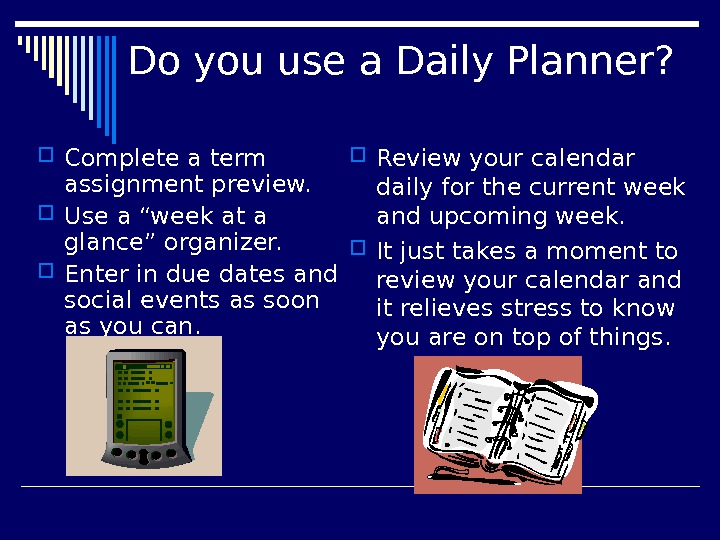
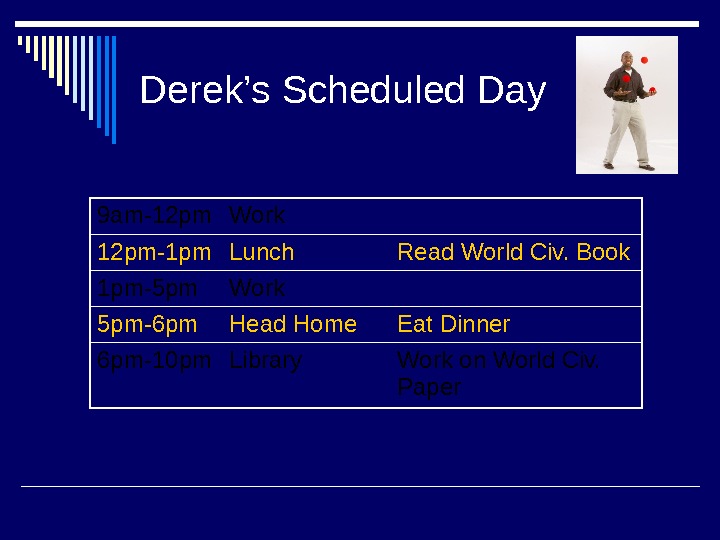


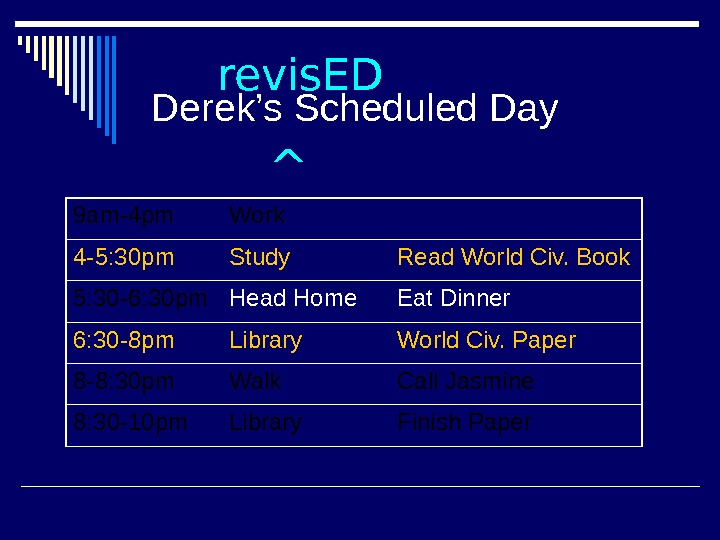


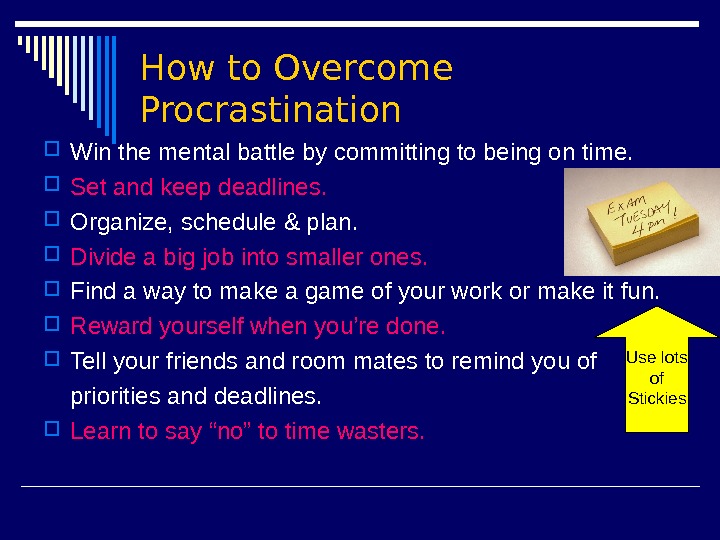
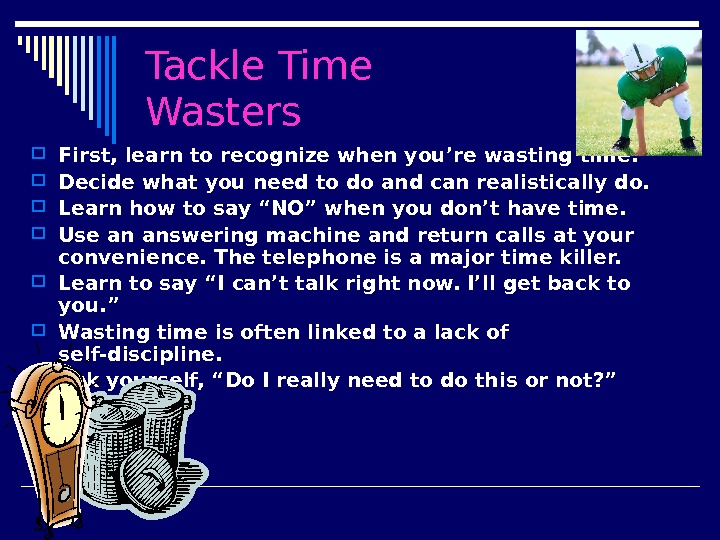
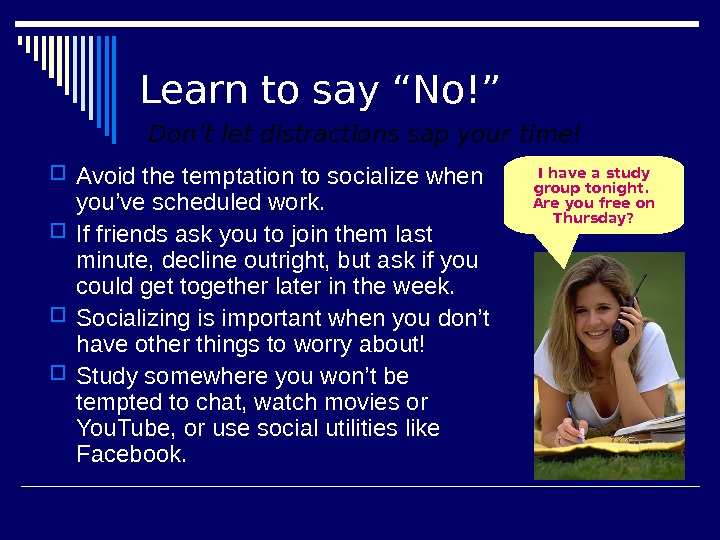



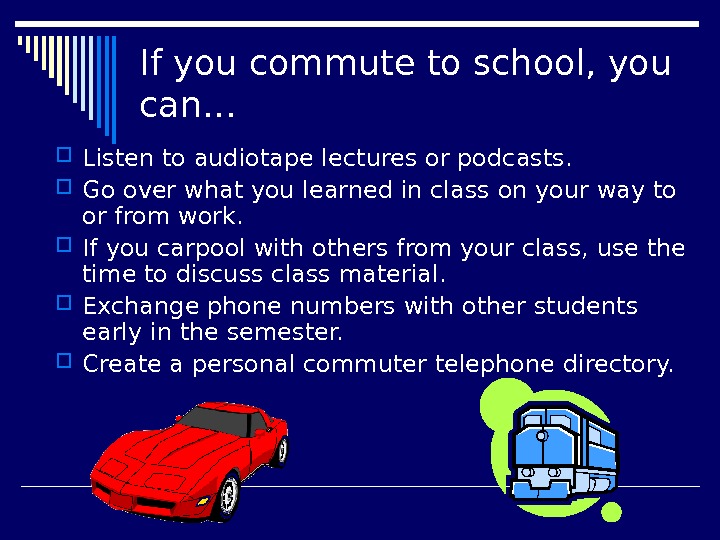
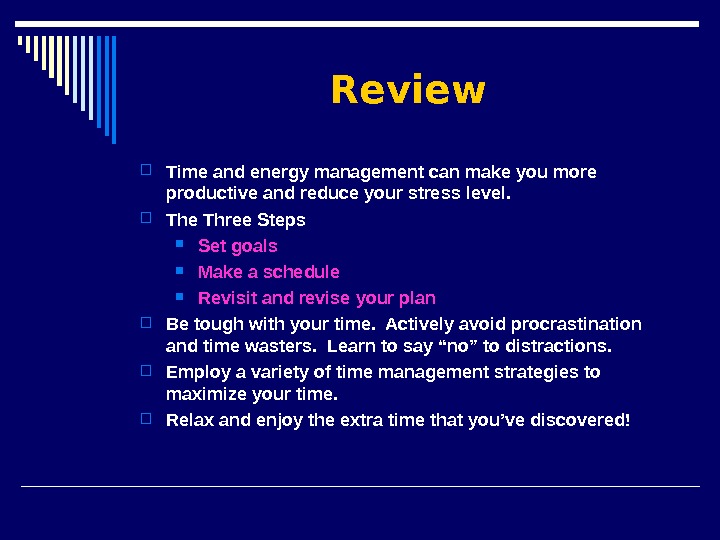
- Размер: 2.4 Mегабайта
- Количество слайдов: 27
Описание презентации Managing Time There are 168 hours in по слайдам
 Managing Time There are 168 hours in every week. How are you spending yours? Sleeping Going to the Gym Getting ready for class Working on campus Shopping for groceries Caring for family members Going out with friends Cultivating a relationship Meeting new people Going to office hours Volunteering Going to class Studying for tests Doing library research Taking a nap Exercising Catching up! Commuting Getting around campus Playing an instrument Trying to unwind Attending events on campus Helping a friend Checking email Revising your essay Getting coffee Chatting with friends Keeping in touch with family
Managing Time There are 168 hours in every week. How are you spending yours? Sleeping Going to the Gym Getting ready for class Working on campus Shopping for groceries Caring for family members Going out with friends Cultivating a relationship Meeting new people Going to office hours Volunteering Going to class Studying for tests Doing library research Taking a nap Exercising Catching up! Commuting Getting around campus Playing an instrument Trying to unwind Attending events on campus Helping a friend Checking email Revising your essay Getting coffee Chatting with friends Keeping in touch with family
 Myths about Time Management Time management is nothing but common sense. I do well in school, so I must be managing my time effectively. Time management ? I work better under pressure. It takes all the fun out of life!!!No matter what I do, I won’t have enough time!
Myths about Time Management Time management is nothing but common sense. I do well in school, so I must be managing my time effectively. Time management ? I work better under pressure. It takes all the fun out of life!!!No matter what I do, I won’t have enough time!
 The Truth! Yes! As college students, you are very busy people, and to make those 168 hours effective, you have to do some planning. The Benefits of Time Management You are more productive. . You reduce your stress. . You improve your self-esteem. . You achieve balance in your life. You avoid meltdowns. . You feel more confident in your ability to get things done. You reach your goals. . What is Time Management? Simply, making the most of your time and energy!
The Truth! Yes! As college students, you are very busy people, and to make those 168 hours effective, you have to do some planning. The Benefits of Time Management You are more productive. . You reduce your stress. . You improve your self-esteem. . You achieve balance in your life. You avoid meltdowns. . You feel more confident in your ability to get things done. You reach your goals. . What is Time Management? Simply, making the most of your time and energy!
 A Word about ENERGY The most overlooked aspect of time management is your energy level. • Evaluate your energy level at different times of day. • Schedule tasks when you have the energy level to match. • If you are a “morning person, ” seize the early hours to study and do assignments that require focus. • If you are an “evening person, ” make sure that you are being productive and not sacrificing sleep for extra hours to socialize. • Losing sleep is the easiest way to sabotage your energy level! Don’t let this be you!
A Word about ENERGY The most overlooked aspect of time management is your energy level. • Evaluate your energy level at different times of day. • Schedule tasks when you have the energy level to match. • If you are a “morning person, ” seize the early hours to study and do assignments that require focus. • If you are an “evening person, ” make sure that you are being productive and not sacrificing sleep for extra hours to socialize. • Losing sleep is the easiest way to sabotage your energy level! Don’t let this be you!
 Steps to Managing Your Time 1. Set goals 2. Make a schedule 3. Revisit and revise your plan
Steps to Managing Your Time 1. Set goals 2. Make a schedule 3. Revisit and revise your plan
 Make your goals specific and concrete. Don’t be vague. Set both long-term goals and short-term ones to support them. Set a deadline for your goals. Integrate your goals: school, personal and career. Realize that goals change, but know which goals to stick to! Go for the goal!Where to start? 1. Set Goals!
Make your goals specific and concrete. Don’t be vague. Set both long-term goals and short-term ones to support them. Set a deadline for your goals. Integrate your goals: school, personal and career. Realize that goals change, but know which goals to stick to! Go for the goal!Where to start? 1. Set Goals!
 Set Goals! continued What’s important and what isn’t? What order do things need to be done in? Once you know what your priorities are, you need to plan out a schedule for the semester, the week and the day. Planning may seem hard at first, but the more you do it, the easier and more natural it gets. From your goals, set priorities.
Set Goals! continued What’s important and what isn’t? What order do things need to be done in? Once you know what your priorities are, you need to plan out a schedule for the semester, the week and the day. Planning may seem hard at first, but the more you do it, the easier and more natural it gets. From your goals, set priorities.
 2. Make a Schedule Set Up Your Semester Calendar Look at the syllabus for the class schedule. Begin with blocking all class and lab times. Block all other set time obligations: Work, meetings and so on… Highlight all exams and project due dates. Identify routine homework days. Work backwards from exams and papers and map out study/writing time. Don’t forget to take a break once in a while.
2. Make a Schedule Set Up Your Semester Calendar Look at the syllabus for the class schedule. Begin with blocking all class and lab times. Block all other set time obligations: Work, meetings and so on… Highlight all exams and project due dates. Identify routine homework days. Work backwards from exams and papers and map out study/writing time. Don’t forget to take a break once in a while.
 Make a Schedule continued Set Up Your Weekly Plan Spend 30 minutes or so mapping out the week. Ask yourself these questions about the week: What do I expect to accomplish? What will I have to do to reach these goals? What tasks are more important than others? How much time will each activity take? When will I do each activity? How flexible do I have to be to allow for unexpected things? Where does the time go?
Make a Schedule continued Set Up Your Weekly Plan Spend 30 minutes or so mapping out the week. Ask yourself these questions about the week: What do I expect to accomplish? What will I have to do to reach these goals? What tasks are more important than others? How much time will each activity take? When will I do each activity? How flexible do I have to be to allow for unexpected things? Where does the time go?
 Derek’s Schedule With everything that I’m juggling, I need to use some major time management skills!
Derek’s Schedule With everything that I’m juggling, I need to use some major time management skills!
 A Week in Derek’s Semester Monday Tuesday Wednesday Thursday Friday Saturday Sunday 22 Work til 5: 00 Biology 5 -7 pm 23 Work til 5: 00 Finish World Civilization Paper at the Library 6 -10 pm 24 Work til 5: 00 World Civilization 6 -9 pm Paper Due 25 Work til 5: 00 Biology 5 -7 pm Lab Due Next Week 26 Work til 5: 00 Mom’s Birthday Party 6: 00 pm 27 Bike Ride 8: 30 am Choir 10 am Work on Bio Lab Report 12 pm Pick up Keith at the airport 3 pm 28 World Civ Reading 9 am Church 10: 30 Barbecue at Ronda’s 1 pm Catch up on homework 7 -10 pm How effective is Derek’s schedule? Does he allow enough time to accomplish what he schedules? Is he paying attention to his energy level? Does it look like Derek will accomplish everything he plans? How well will he be able to accomplish certain tasks?
A Week in Derek’s Semester Monday Tuesday Wednesday Thursday Friday Saturday Sunday 22 Work til 5: 00 Biology 5 -7 pm 23 Work til 5: 00 Finish World Civilization Paper at the Library 6 -10 pm 24 Work til 5: 00 World Civilization 6 -9 pm Paper Due 25 Work til 5: 00 Biology 5 -7 pm Lab Due Next Week 26 Work til 5: 00 Mom’s Birthday Party 6: 00 pm 27 Bike Ride 8: 30 am Choir 10 am Work on Bio Lab Report 12 pm Pick up Keith at the airport 3 pm 28 World Civ Reading 9 am Church 10: 30 Barbecue at Ronda’s 1 pm Catch up on homework 7 -10 pm How effective is Derek’s schedule? Does he allow enough time to accomplish what he schedules? Is he paying attention to his energy level? Does it look like Derek will accomplish everything he plans? How well will he be able to accomplish certain tasks?
 Do you have a schedule? Organizing Your Day: “ Work smarter, not harder. ”- Alan Lakein Set realistic goals, there are only 24 hours in a day. Use spare time to review. Study at the same time each day: make it a habit Divide study time into 50 -minute blocks. Don’t forget to reward yourself when you do something right!
Do you have a schedule? Organizing Your Day: “ Work smarter, not harder. ”- Alan Lakein Set realistic goals, there are only 24 hours in a day. Use spare time to review. Study at the same time each day: make it a habit Divide study time into 50 -minute blocks. Don’t forget to reward yourself when you do something right!
 Do you use a Daily Planner? Complete a term assignment preview. Use a “week at a glance” organizer. Enter in due dates and social events as soon as you can. Review your calendar daily for the current week and upcoming week. It just takes a moment to review your calendar and it relieves stress to know you are on top of things.
Do you use a Daily Planner? Complete a term assignment preview. Use a “week at a glance” organizer. Enter in due dates and social events as soon as you can. Review your calendar daily for the current week and upcoming week. It just takes a moment to review your calendar and it relieves stress to know you are on top of things.
 Derek’s Scheduled Day 9 am-12 pm Work 12 pm-1 pm Lunch Read World Civ. Book 1 pm-5 pm Work 5 pm-6 pm Head Home Eat Dinner 6 pm-10 pm Library Work on World Civ. Paper
Derek’s Scheduled Day 9 am-12 pm Work 12 pm-1 pm Lunch Read World Civ. Book 1 pm-5 pm Work 5 pm-6 pm Head Home Eat Dinner 6 pm-10 pm Library Work on World Civ. Paper
 Derek’s Scheduled Day ruined Derek, I need your report by 1 pm. It might cut into your lunch hour, but it’s a top priority. Derek, I might be late getting home from work. We might not eat til later.
Derek’s Scheduled Day ruined Derek, I need your report by 1 pm. It might cut into your lunch hour, but it’s a top priority. Derek, I might be late getting home from work. We might not eat til later.
 Derek’s Scheduled Day SAVED If I have to work through lunch can I leave early? I have an important class assignment that I need to work on. That should be alright. Okay, I’ll plan to be home at 6: 00. If I feel tired at the library, I’ll just take a walk.
Derek’s Scheduled Day SAVED If I have to work through lunch can I leave early? I have an important class assignment that I need to work on. That should be alright. Okay, I’ll plan to be home at 6: 00. If I feel tired at the library, I’ll just take a walk.
 Derek’s Scheduled Day 9 am-4 pm Work 4 -5: 30 pm Study Read World Civ. Book 5: 30 -6: 30 pm Head Home Eat Dinner 6: 30 -8 pm Library World Civ. Paper 8 -8: 30 pm Walk Call Jasmine 8: 30 -10 pm Library Finish Paperrevis. ED ^
Derek’s Scheduled Day 9 am-4 pm Work 4 -5: 30 pm Study Read World Civ. Book 5: 30 -6: 30 pm Head Home Eat Dinner 6: 30 -8 pm Library World Civ. Paper 8 -8: 30 pm Walk Call Jasmine 8: 30 -10 pm Library Finish Paperrevis. ED ^
 3. Revisit and Revise Your Plan Are you making progress? Now that you’ve been paying attention to your schedule, how are you actually using your time? Which tasks were you able to do? What didn’t get done? Was your energy level appropriate? Your stress level? What changes need to be made to your weekly schedule? What are persistent time wasters? Could better communication have helped you stick to your plan? Was procrastination an issue?
3. Revisit and Revise Your Plan Are you making progress? Now that you’ve been paying attention to your schedule, how are you actually using your time? Which tasks were you able to do? What didn’t get done? Was your energy level appropriate? Your stress level? What changes need to be made to your weekly schedule? What are persistent time wasters? Could better communication have helped you stick to your plan? Was procrastination an issue?
 Procrastination: “Never do today what you can put off ‘till tomorrow!” Forms of procrastination: Ignoring the task, hoping it will go away Underestimating how long it will take Overestimating your abilities and resources Telling yourself that poor performance is okay Doing something else that isn’t very important Believing that repeated “minor” delays won’t hurt you Talking about a hard job rather than doing it Putting all your work on only one part of the task Becoming paralyzed when having to make choices
Procrastination: “Never do today what you can put off ‘till tomorrow!” Forms of procrastination: Ignoring the task, hoping it will go away Underestimating how long it will take Overestimating your abilities and resources Telling yourself that poor performance is okay Doing something else that isn’t very important Believing that repeated “minor” delays won’t hurt you Talking about a hard job rather than doing it Putting all your work on only one part of the task Becoming paralyzed when having to make choices
 How to Overcome Procrastination Win the mental battle by committing to being on time. Set and keep deadlines. Organize, schedule & plan. Divide a big job into smaller ones. Find a way to make a game of your work or make it fun. Reward yourself when you’re done. Tell your friends and room mates to remind you of priorities and deadlines. Learn to say “no” to time wasters. Use lots of Stickies
How to Overcome Procrastination Win the mental battle by committing to being on time. Set and keep deadlines. Organize, schedule & plan. Divide a big job into smaller ones. Find a way to make a game of your work or make it fun. Reward yourself when you’re done. Tell your friends and room mates to remind you of priorities and deadlines. Learn to say “no” to time wasters. Use lots of Stickies
 Tackle Time Wasters First, learn to recognize when you’re wasting time. Decide what you need to do and can realistically do. Learn how to say “NO” when you don’t have time. Use an answering machine and return calls at your convenience. The telephone is a major time killer. Learn to say “I can’t talk right now. I’ll get back to you. ” Wasting time is often linked to a lack of self-discipline. Ask yourself, “Do I really need to do this or not? ”
Tackle Time Wasters First, learn to recognize when you’re wasting time. Decide what you need to do and can realistically do. Learn how to say “NO” when you don’t have time. Use an answering machine and return calls at your convenience. The telephone is a major time killer. Learn to say “I can’t talk right now. I’ll get back to you. ” Wasting time is often linked to a lack of self-discipline. Ask yourself, “Do I really need to do this or not? ”
 Learn to say “No!” Avoid the temptation to socialize when you’ve scheduled work. If friends ask you to join them last minute, decline outright, but ask if you could get together later in the week. Socializing is important when you don’t have other things to worry about! Study somewhere you won’t be tempted to chat, watch movies or You. Tube, or use social utilities like Facebook. Don’t let distractions sap your time! I have a study group tonight. Are you free on Thursday?
Learn to say “No!” Avoid the temptation to socialize when you’ve scheduled work. If friends ask you to join them last minute, decline outright, but ask if you could get together later in the week. Socializing is important when you don’t have other things to worry about! Study somewhere you won’t be tempted to chat, watch movies or You. Tube, or use social utilities like Facebook. Don’t let distractions sap your time! I have a study group tonight. Are you free on Thursday?
 Revisit Your Values Knowing what is most valuable to you gives direction to your life. Your energy should be oriented first toward things that reflect the values that are most important. Examine your values to help you make time management decisions.
Revisit Your Values Knowing what is most valuable to you gives direction to your life. Your energy should be oriented first toward things that reflect the values that are most important. Examine your values to help you make time management decisions.
 Time Management Techniques The Set Time Method Block out a specific time to accomplish a task. Examples: Monday 1: 00— 2: 00 Work physics problems Saturday 9: 00— 11: 30 Go to the gym The Swiss Cheese Approach Whenever you find yourself with some free time, do a small part of a larger task Examples: Arrive to class 10 minutes early and brainstorm research ideas while waiting for your friend to arrive for lunch, review notes from today’s History lecture.
Time Management Techniques The Set Time Method Block out a specific time to accomplish a task. Examples: Monday 1: 00— 2: 00 Work physics problems Saturday 9: 00— 11: 30 Go to the gym The Swiss Cheese Approach Whenever you find yourself with some free time, do a small part of a larger task Examples: Arrive to class 10 minutes early and brainstorm research ideas while waiting for your friend to arrive for lunch, review notes from today’s History lecture.
 REVISE and PREVIEW: Staying on top of things… Immediately note all changes. Exam/Paper due date revisions Meeting additions/cancellations Work schedule changes Upcoming visitors, etc… Preview the upcoming week making any necessary adjustments. Preview each day to see what might happen…
REVISE and PREVIEW: Staying on top of things… Immediately note all changes. Exam/Paper due date revisions Meeting additions/cancellations Work schedule changes Upcoming visitors, etc… Preview the upcoming week making any necessary adjustments. Preview each day to see what might happen…
 If you commute to school, you can… Listen to audiotape lectures or podcasts. Go over what you learned in class on your way to or from work. If you carpool with others from your class, use the time to discuss class material. Exchange phone numbers with other students early in the semester. Create a personal commuter telephone directory.
If you commute to school, you can… Listen to audiotape lectures or podcasts. Go over what you learned in class on your way to or from work. If you carpool with others from your class, use the time to discuss class material. Exchange phone numbers with other students early in the semester. Create a personal commuter telephone directory.
 Review Time and energy management can make you more productive and reduce your stress level. The Three Steps Set goals Make a schedule Revisit and revise your plan Be tough with your time. Actively avoid procrastination and time wasters. Learn to say “no” to distractions. Employ a variety of time management strategies to maximize your time. Relax and enjoy the extra time that you’ve discovered!
Review Time and energy management can make you more productive and reduce your stress level. The Three Steps Set goals Make a schedule Revisit and revise your plan Be tough with your time. Actively avoid procrastination and time wasters. Learn to say “no” to distractions. Employ a variety of time management strategies to maximize your time. Relax and enjoy the extra time that you’ve discovered!

